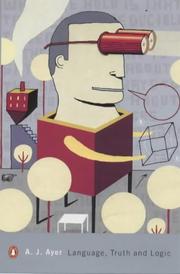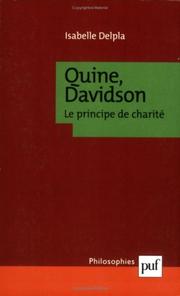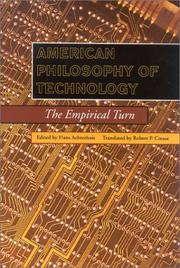| Listing 1 - 5 of 5 |
Sort by
|

Abstract | Keywords | Export | Availability | Bookmark
 Loading...
Loading...Choose an application
- Reference Manager
- EndNote
- RefWorks (Direct export to RefWorks)

ISSN: 07661398 ISBN: 2130520154 9782130520153 Year: 2001 Volume: 146 Publisher: Paris: PUF,
Abstract | Keywords | Export | Availability | Bookmark
 Loading...
Loading...Choose an application
- Reference Manager
- EndNote
- RefWorks (Direct export to RefWorks)
Quine, Willard Van Orman --- Davidson, Donald --- Logic, Modern --- Philosophy, American --- Logique moderne --- Philosophie américaine --- History and criticism --- Histoire et critique --- Quine, W. V. --- Davidson, Donald, --- Philosophie américaine

ISBN: 0253214491 0253339030 9780253214492 Year: 2001 Publisher: Bloomington (Ind.): Indiana university press,
Abstract | Keywords | Export | Availability | Bookmark
 Loading...
Loading...Choose an application
- Reference Manager
- EndNote
- RefWorks (Direct export to RefWorks)
Introduces contemporary American philosophy of technology through six of its leading figures. The six American philosophers of technology whose work is profiled in this clear and concise introduction to the field―Albert Borgmann, Hubert Dreyfus, Andrew Feenberg, Donna Haraway, Don Ihde, and Langdon Winner―represent a new, empirical direction in the philosophical study of technology that has developed mainly in North America. In place of the grand philosophical schemes of the classical generation of European philosophers of technology (including Martin Heidgger, Jacques Ellul, and Hans Jonas), the contemporary American generation addresses concrete technological practices and the co-evolution of technology and society in modern culture. Six Dutch philosophers associated with Twente University survey and critique the full scope and development of their American colleagues’ work, often illustrating shifts from earlier to more recent interests. Individual chapters focus on Borgmann’s engagement with technology and everyday life; Dreyfus’s work on the limits of artificial intelligence; Feenberg’s perspectives on the cultural and social possibilities opened by technologies; Haraway’s conception of the cyborg and its attendant blurring of boundaries; Ihde’s explorations of the place of technology in the lifeworld; and Winner’s fascination with the moral and political implications of modern technologies. American Philosophy of Technology offers an insightful and readable introduction to this new and distinctly American philosophical turn.
Technology --- Philosophy, American --- Technologie --- Philosophie américaine --- Philosophy. --- Philosophie --- -Applied science --- Arts, Useful --- Science, Applied --- Useful arts --- Science --- Industrial arts --- Material culture --- Philosophy --- -Philosophy --- Philosophie américaine --- Technology and civilization --- Technology - Philosophy.

ISBN: 0199241597 9780199241590 Year: 2001 Publisher: Oxford (N.Y.): Clarendon,
Abstract | Keywords | Export | Availability | Bookmark
 Loading...
Loading...Choose an application
- Reference Manager
- EndNote
- RefWorks (Direct export to RefWorks)
History of philosophy --- Wittgenstein, Ludwig J.J. --- Philosophy, American --- Philosophie américaine --- Congresses --- Congrès --- Wittgenstein, Ludwig, --- Wittgenstein, Ludwig --- Philosophie américaine --- Congrès --- Wei-tʻe-ken-ssu-tʻan, --- Wei-tʻe-ken-ssu-tʻan, Lu-te-wei-hsi, --- Wittgenstein, L. --- Vitgenshteĭn, L., --- Wei-ken-ssu-tʻan, --- Pitʻŭgensyutʻain, --- Vitgenshteĭn, Li︠u︡dvig, --- Weitegenshitan, --- Wittgenstein, Ludovicus, --- Vitgenshtaĭn, Ludvig, --- ויטגנשטיין, לודוויג --- 维特根斯坦, --- Congresses. --- Wittgenstein, Ludwig Josef Johann, --- Wittgenstein, Ludwig, - 1889-1951 - Congresses --- Wittgenstein, Ludwig, - 1889-1951

ISBN: 0374528497 9780374528492 Year: 2001 Publisher: New York (N.Y.) : Farrar, Straus and Giroux,
Abstract | Keywords | Export | Availability | Bookmark
 Loading...
Loading...Choose an application
- Reference Manager
- EndNote
- RefWorks (Direct export to RefWorks)
"The Civil War made America a modern nation, unleashing forces of industrialism and expansion that had been kept in check for decades by the quarrel over slavery. But the war also discredited the ideas and beliefs of the era that preceded it. The Civil War swept away the slave civilization of the South, but almost the whole intellectual culture of the North went with it. It took nearly half a century for Americans to develop a set of ideas, a way of thinking, that would help them cope with the conditions of modern life. That struggle is the subject of this book." "The story told in The Metaphysical Club runs through the lives of Oliver Wendell Holmes, Jr., a Civil War hero who became the dominant legal thinker of his time; his best friend as a young man, William James, son of an eccentric moral philosopher, brother of a great novelist, and the father of modern psychology in America; and the brilliant and troubled logician, scientist, and founder of semiotics, Charles Sanders Peirce. Together they belonged to an informal discussion group that met in Cambridge, Massachusetts, in 1872 and called itself the Metaphysical Club. The club was probably in existence for only nine months, and no records were kept. The one thing we know that came out of it was an idea - an idea about ideas, about the role beliefs play in people's lives. This idea informs the writings of these three thinkers, and the work of the fourth figure in the book, John Dewey - student of Peirce, friend and ally of James, admirer of Holmes." "The Metaphysical Club begins with the Civil War and ends in 1919 with the Supreme Court's decision in U.S. v. Abrams, the basis for the modern law of free speech. It tells the story of the creation of ideas and values that changed the way Americans think and the way they live."--Jacket
Metaphysics --- Philosophy, American --- Intellectuals --- Pragmatism --- Métaphysique --- Philosophie américaine --- Intellectuels --- Pragmatisme --- History --- Histoire --- Holmes, Oliver Wendell, --- James, William, --- Peirce, Charles S. --- Dewey, John, --- Cambridge (Mass.) --- United States --- Etats-Unis --- Intellectual life --- Vie intellectuelle --- National characteristics, American --- Social conditions --- Peirce, Charles Sanders, --- Métaphysique --- Philosophie américaine --- #KVHA:American Studies --- #KVHA:Filosofie; Verenigde Staten --- Metaphysics - History - 20th century --- Intellectuals - United States - History - 20th century --- Holmes, Oliver Wendell, - Jr., - 1841-1935 --- James, William, - 1842-1910 --- Peirce, Charles Sanders, - 1839-1914 --- Dewey, John, - 1859-1952 --- United States - Intellectual life - 20th century --- United States - Social conditions - 20th century --- Cambridge (Mass.) - Intellectual life - 20th century --- Famous Persons. --- History, 19th Century. --- National characteristics, American. --- Social Conditions. --- United States.
| Listing 1 - 5 of 5 |
Sort by
|

 Search
Search Feedback
Feedback About UniCat
About UniCat  Help
Help News
News